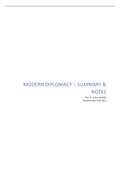MODERN DIPLOMACY – SUMMARY &
NOTES
Prof. dr. Johan Verbeke
Academic year 2020-2021
,2
, CLASS 1 – INTRODUCTION
PRACTICALITIES
This is a practice-oriented course à no traditional lectures
- Lot of interaction, ask questions, raise comments, etc.
Typical framework of the classes:
- Johan explains some things that are reflected in the textbook
- Then, q&a time
- Then, more explanation
- Q&a
- …
Asking questions is very important
- The most important skill of a diplomat is negotiation
- Public speaking is also very important
o Feel at ease communicating with people you don’t know
13 classes
- Last class: entirely dedicated to questions about our future
- How do you build a career?
- What is the difference between being a functionaire and being a civil servant in the UN
- Diplomacy in business, etc. diplomacy in real life
Exam: to the extent possible, an oral, physical exam
- 4 parts
o Written assignment (couple of little assignments: 4-5): 5/20
§ Short questions for which you have to reflect, do a little research and
formulate a pertinent argument
§ Writing assignments should be as good as possible in terms of form
§ Make sure there is a good structure
• This is my position, followed by a logical line of arguments, then
coming to a conclusion
§ Articulate, well-written document
o Political diplomatic analysis of a situation: kind of case study (half hour preparation
time during exam): 5/20
§ Often a crisis situation, or opinions that have clashed, something that
happened at Parliament, General Assemby, etc.
§ In the shoes of a diplomat
• What is the problem and what would you suggest?
o Knowledge question: 5/20)
§ Some chapters of the book will be for this question, prof. will indicate which
ones
3
, • Not a question on pure facts and figures
• More about knowledge in terms of reflections, but to the extent to
which understanding of the chapters is also tested
§ Chapter on conflict cycle and use of force will definitely be part of this!
§ What was the problem with that treaty? What are the criteria for
considering a war as being a just war? (answer in general, assess
importance, no simple enumeration)
o Skills question: 5/20
§ Covered in the last part of the coursebook
§ Range from conversation, debate, argumentation, leadership, negotiation,
chairing a meeting, etc.
§ Also, negative skills: positively/constructively not doing something
§ You are the spokesperson of your minister and you are going somewhere
(e.g. Tehran, Iran), sth happens at the very beginning of the contact,
someone is not there à how will you solve this as a spokesperson?
§ Application of the skills that we will be seeing in the last part of the course
Textbook:
- We will not cover everything à not all chapters will be part of the course
- Consult the indicative list
- Go through course in natural way
- Compromise is messy ßà lawyer is very neat
à This course is letting you feel how a diplomat’s mind should work properly
START OF THE CLASS
Prof. went over the table of contents
Introduction: setting the scene
- What is an interesting way to approach “what is diplomacy”.
- Socratic fallacy: always asking “what”-questions
o There is no single answer to a question
- Methodological approach
- Rule of law is procedural concept
o ßà human rights: substantive concept
3 parts:
- Conceptual framework of diplomacy
- The normative framework of diplomacy
- Diplomatic skills (practical framework)
PART 1: CONCEPTUAL FRAMEWORK
4




